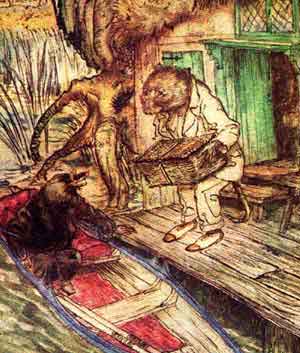I can hardly wait for Harold Pinter's Nobel address - he could rip Tony and George new ones, in their squalid bedsit, with barely the lift of his smallest finger. Dunnit already. All cunts.
David E. said this Thursday:
"Linguistic power games figure early on in his work. The Birthday Party begins as a sinister jape out of a Hitchcock thriller only to quickly evolve into something primal about power and its application. From the obscure trio of The Caretaker (where two brothers spar for the ownership of a tramp) to the seemingly familiar (at least at first) family dynamic of The Homecoming, Pinter rained cold showers on the alleged "brotherhood of man" — especially in its Renoir-pimped "Everyone has his reasons" form. For Pinter knows there is only one reason: Power. Yet this facing of the terrible truth hasn’t left him a cyncical [sic] man. Nor does he encourage cynicism in others. Quite the contrary. As recent years have shown he has taken advantage of every occasion imaginable to speak out against injustice. And his later plays (rarely performed in the U.S.) speak of injustice consistently. Particularly the injustice of torture."
Yes. I recognize the argument from power, especially in those chamber plays - Beckett is mentioned, but Strindberg could be, as well - in which any conviviality would be impossible without a map to prove its falsity. I just have a hard time believing in that much lust for control - even after having experienced it; if you're going to waste your energies putting your heel to everyones' throat, and really get there, you know, well, more power to you, but I'm outta here. I know much nicer people.
And fuck you.
As a kind of counterpoint today, I was reading John Leonard's piece in the NYRB about Joan Didion's account of her catastrophic year - her entire immediate family taken down - The Year of Magical Thinking. This stringent writer, conservative by upbringing and temperament, discovers in the 1980's, according to Leonard:
"Thus she'd seem the unlikeliest of writers to turn into a disenchanted legionnaire "on the far frontiers of the Monroe Doctrine," at the porous borders of the American imperium. Somehow, though, she went left and went south, to discover in the Latin latitudes more than her own unbearable whiteness of being. In El Salvador between "grimgrams," body dumps, and midnight screenings on videocassettes of Apocalypse Now and Bananas, Didion decided that Gabriel García Márquez was in fact "a social realist."
Which dawning wouldn't have been so difficult if she'd given Faulkner his due (as Garcia-Marquez already had, and so many other Sud-Ams) - but it's a beginning.
I am pretty sure Pinter gets this, too, but he doesn't have an English Faulkner to lean on - there is, to my knowledge, no such person - and so we are back to chambers and drawing rooms, and pubs and bedsits. Wherein the "brotherhood of man" can certainly look cheap. God knows there are enormous forces arrayed to cheapen the idea now, because it is hostile in its very being to the Power they hold most dear - Power that Pinter indeed does know, as an oncologist knows tumors, cancers - but I want to know what happens after he says his resounding, "NO." If he cannot provide it, we'd all better be thinking of a fucking alternative.
Subscribe to:
Post Comments (Atom)

No comments:
Post a Comment